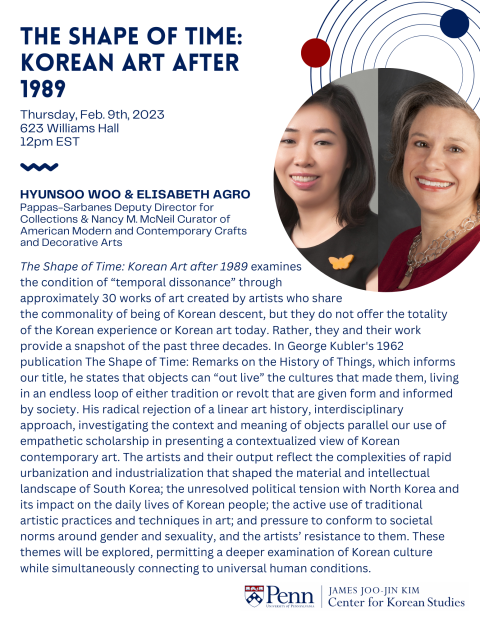
Korean Studies Colloquium
623 Williams Hall
The Shape of Time: Korean Art after 1989 examines the condition of “temporal dissonance” through approximately 30works of art created by artists who share the commonality of being of Korean descent, but they do not offer the totality of the Korean experience or Korean art today. Rather, they and their work provide a snapshot of the past three decades. In George Kubler's 1962 publication The Shape of Time: Remarks on the History of Things, which informs our title, he states that objects can “out live” the cultures that made them, living in an endless loop of either tradition or revolt that are given form and informed by society. His radical rejection of a linear art history, interdisciplinary approach, investigating the context and meaning of objects parallel our use of empathetic scholarship in presenting a contextualized view of Korean contemporary art. The artists and their output reflect the complexities of rapid urbanization and industrialization that shaped the material and intellectual landscape of South Korea; the unresolved political tension with North Korea and its impact on the daily lives of Korean people; the active use of traditional artistic practices and techniques in art; and pressure to conform to societal norms around gender and sexuality, and the artists’ resistance to them. These themes will be explored,permitting a deeper examination of Korean culture while simultaneously connecting to universal human conditions.
Hyunsoo Woo, the Pappas-Sarbanes Deputy Director for Collections, formally the Maxine and Howard Curator of Korean Art and the Head of the East Asian Art Department, Philadelphia Museum of Art, is a leading authority on Korean Art and one of only a few Korean art curators in the United States. With a wide range of curatorial interests from traditional to contemporary Korean art, Woo curated PMA’s first Korean American female artist’s solo exhibition, Jean Shin: Collections (2018). Her 2014 special exhibition at PMA, Treasures from Korea: Arts and Culture of the Joseon Dynasty, 1392-1910, was highly acclaimed and also traveled to the Los Angeles County Museum of Art and the Museum of Fine Arts, Houston. The exhibition accompanied a substantial scholarly catalogue of the same title published by the Yale University Press. Woo is currently co-curating a large-scale special exhibition on contemporary Korean Art, The Shape of Time: Korean Art After 1989 to be presented in October 2023. Prior to her appointment at PMA in 2006, Woo held positions at the Brooklyn Museum (1997-2001) and Japan Society Gallery, New York (2001-2005). Woo received a Master of Arts degree in Visual Arts Administration from New York University, a Master of Arts degree in Korean Art History and a Bachelor of Arts degree in Chinese Language and Literature from Ewha Womans University, Seoul.
Elisabeth Agro, a museum curator and historian, embraces authenticity and pragmatism while bringing humanity into her discipline. She works collaboratively with colleagues and artists to advance an international view of contemporary decorative arts. Her curatorial practice privileges empathetic scholarship, examining cultural, socio-political, and economic contexts to foster a deeper understanding of contemporary art and the lived experience it captures. As a co-Founder of Critical Craft Forum, Elisabeth is committed to craft’s inclusion in the ever-changing global landscape of contemporary art and rethinking craft’s past as well as documenting shifts in its relationship to nomenclature, classifications, marketplace, and presentation of the museum’s collection. Her current projects include co-curating The Shape of Time: Korean Art after 1989, a cross-departmental major exhibition examining temporal dissonance in contemporary Korean art; New Grit: Art & Philly Now, which inaugurated the museum’s Daniel W. Dietrich II Galleries for contemporary art; and contributing to the four-volume catalogue of the PMA’s American silver collection.
 James Joo-Jin Kim Center for Korean Studies
James Joo-Jin Kim Center for Korean Studies